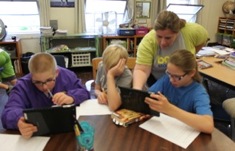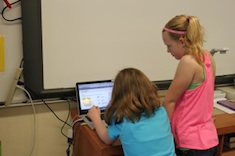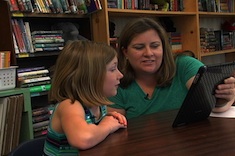On any given day teachers can be seen lecturing in classrooms across the country. At the same time on any given day students can be seen, with arms outstretched, trying to conceal one of their most prized possessions – their cell phone.
Although many of us see the phone as a constant source of distraction, others see the phone as yet another way to meet students where they are – to take advantage of students focused 100% on something. When they are least expecting it, the solution may be to teacher time warp.
When I look at my daily lesson plans, I see a week's worth of material packed into a fifty minute slot for each of my high school English classes. Traditionally, I have tried to combat the problem by talking too fast and giving handout after handout of notes no one will look at after the test I am forced to give. I leave little time for real questions, and even less time for in class reading, workshops and discussion. When the day ends I leave the school dragging, while my students have the energy for what I would consider another week's worth of activities they've crunch into the second half or their days. I am exhausted because I've sprinted through class six times, and they are not exhausted. I haven't made them think enough or engaged them enough in anything because I haven't the time. But they go on, arms outstretched, reading those texts as they run, walk, drive, eat. The constant I see from the classroom to the after-school activities is…the phone.
How can I take advantage of that phone and at the same time free up my class time for workshop activities? By Tweet, Tweet, Tweeting with my new friend Twitter.
Tweet Meets Summer Reading
This summer my Honors American Literature class was instructed to read three novels. They were free to choose any book they wanted, as long as it fit into one of a number of categories. The books had to be set in America and written by an American author. One of the novels needed to have a strong protagonist, the other needed to have and issue of race relations or discrimination of some kind, and the third had to deal with a reaction to an event in history.
The idea when we left school was to find the books we wanted to read for summer reading or throughout the year. I listed 100 choices. I hadn't read them all, and wanted to spend the summer in search of the perfect books to share with this class as well as future classes. Something wonderful happened. Students read like crazy trying to find books that fit the criteria. Instead of moaning about having to read books that I had assigned, they read all kinds of books, far more than what I could have assigned in good conscious.
So how does Twitter play into this? As I was planning for the fall, I came across the list of literary terms students would be expected to know once they left my class and moved on to the next teacher for the second half of the course. Traditionally, I would give students the terms in class, require that they learn the definitions, and quiz them at the end of the week. We might play a game or occasionally an illustration of a term would be underlined in the teacher copy of the text, and I could bring it to the attention of the class as if I miraculously discovered it on my own as we discussed some literary classic.
I would then have these "natural" exchanges with my students – "Look everyone, there is an example of an allusion. Do you see that? Why no, you don't because you are no longer paying one second of attention to me! Your arm is outstretched below your desk and you are texting. But guess what? I can see you because your desk doesn't have a front, and I am looking right at you. Please put your phone away and focus on the allusion I have just discovered."
With my new best friend Twitter, the text my student is receiving is from . . . me! I can now take the time I used to spend in class lecturing like Charlie Brown's teacher and use it for those important discussions. I can use Twitter to teach the lessons I try to sneak in when time permits. This summer, while students were reading their summer reading books, I twittered the literary terms to them. The challenge was to find the terms in their book and twitter back to the rest of us an example. At first we found one at a time, but as the list grew students could find many as they were reading. They reported back to the group. There was friendly banter based on who found the examples first, and if extra credit would be involved.
The greatest part of the experience was that there was no extra credit because there was no regular credit. This was all for fun during the summer. The other fascinating part was that students now know the other students in the class, have had interactions with one another, and felt free to share and discuss the books they were reading. As a result not only does everyone know a good chunk of the terms, but we've been talking books all summer long.
As much as many of us hate to admit, the cell phone and other hand held devices are here to stay. I remember my mentor years ago looking at me and sighing, "This e-mail they're talking about is just another one of those fly-by-night gimmicks they'll have us try. I'll stick to my stationary."
I am sure there are many more ways to hijack the tools our students use proficiently and use them for my own purposes. I just haven't figured them all out. I do know that the time I saved and the fun we had reading and searching this summer is just the start of what we can do. So I'll leave you with the words of the Joker, "Twitter me this . . ." You are right. That is an allusion.







